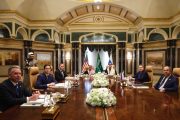
It is quite clear from the favorable coverage received by Pope Francis from the liberal media, as opposed to the mostly negative press experienced by his more conservative predecessor, Benedict XVI, that he is an important player in the push for their agenda. A powerful demonstration of how Francis advances that agenda is this pope’s support for globalist organizations, and his animosity toward anything that smacks of “nationalism.”
On Monday, Francis delivered his “state of the world” address to an audience that included diplomats from various nations, and he took the occasion to condemn nationalism and populism, and recent efforts to curb migration.
Nationalism is defined by globalists, not as the maintenance of nations, with sovereignty over their own affairs, but as a dangerous and racist position that inevitably leads to wars and dictators. The specter of Adolf Hitler is routinely trotted out as the perfect example of a “nationalist.” Rather than respecting the sovereignty of nations, globalists see the nation-state as a relic of a by-gone age in which people took pride in their nation. Instead of patriotism, these internationalists desire to see the reduction of national sovereignty, and the increased power of globalist organizations such as the United Nations, the European Union, the World Trade Organization, and various multilateral trade deals.
Francis has clearly cast his lot with those who favor globalist structures. In his speech he lamented that these internationalist structures “are experiencing a period of difficulty, with the resurgence of nationalistic tendencies.” The pope spoke for an hour, and praised the efforts of the post-World War I League of Nations, but said it ultimately proved unable to contain the what he called the nationalist and populist movements that he argues caused World War II.
“The reappearance of these impulses today is progressively weakening the multilateral system,” Francis said.
Among the issues touched upon in his address were migration, nuclear weapons, and global warming. He praised the Global Compact on Migration, adopted by the UN in Morocco last year, which essentially declared a “right” for migrants to move into any nation they wish. The United States boycotted that meeting, and has rejected its declaration, and has been joined by several other nations, including Hungary, Italy, and Poland.
To the pope, less national sovereignty and more multilateralism is the solution to most of the problems of the world — or at least what he considers problems. “The indispensable premise of multilateral diplomacy is the good will and good faith of the interlocutors, the willingness to a fair and sincere confrontation and the willingness to accept the inevitable compromises that arise from the confrontation between the parties,” Francis said. “When even one of these elements fails, the search for unilateral solutions prevails and, ultimately, the overwhelming of the weaker by the stronger.”
He condemned the unilateral attitudes that “are still undermining the stability of the main international organizations.”
What is needed, according to Pope Francis, is “the patient pursuit of the common good.”
One “problem” that Francis believes needs to be addressed for the “pursuit of the common good” is global warming. This is not a new cause for Francis, who issued an encyclical in 2015 in which he made clear his belief that climate change is real, that it is dangerous, and that it is caused by human activity. The solution, he said, is a new system of global government, because the threat is worldwide.
“Recent world summits on the environment have failed to live up to expectations because, due to a lack of political will, they were unable to reach truly meaningful and effective global agreements on the environment,” Francis said in his encyclical.
While a pontiff’s encyclical is directed at Roman Catholics, Francis expressed hope that others would also read it, and heed its message. Climate-change advocates praised the encyclical, seeing it as an opportunity to add the moral weight of the papacy to getting more people and more nations to accept their views on the subject.
Of course, those who favor world government can be expected to praise the 2015 encyclical and the pope’s remarks this week, condemning “nationalism.” But other positions of the Roman Catholic Church, such as opposition to abortion, are regularly belittled by many of the same globalists who are praising Francis now.
Actually, Francis’ comments in support of strengthened globalist structures appear to be in conflict with a long-held position of the Church, known as subsidiarity. According to this doctrine, “a community of a higher order should not interfere in the internal life of a community of a lower order, depriving the latter of its functions, but rather should support it in case of need and help to co-ordinate its activity with the activities of the rest of society.”
Subsidiarity is a principle quite consistent with America’s founding documents. After all, Americans declared their independence from the British Empire because they did not want to be ordered around on local matters by a far-off distant government in London. It is a principle that all Americans, not just Catholics, should treasure — if it is difficult to fight city hall, just how much more difficult would it be to oppose a world government, which would almost certainly be oppressive and totalitarian.




